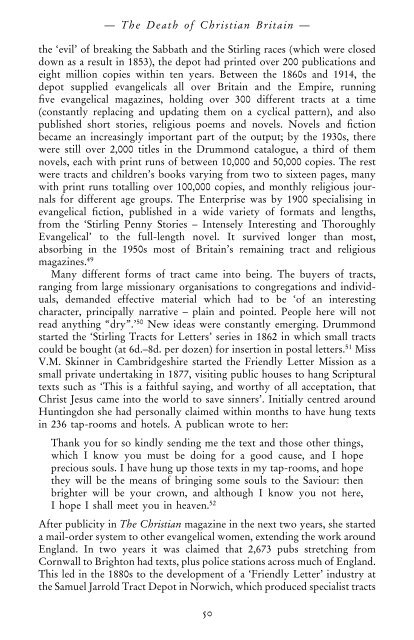The Death of Christian Britain
The Death of Christian Britain
The Death of Christian Britain
Create successful ePaper yourself
Turn your PDF publications into a flip-book with our unique Google optimized e-Paper software.
— <strong>The</strong> <strong>Death</strong> <strong>of</strong> <strong>Christian</strong> <strong>Britain</strong> —<br />
the ‘evil’ <strong>of</strong> breaking the Sabbath and the Stirling races (which were closed<br />
down as a result in 1853), the depot had printed over 200 publications and<br />
eight million copies within ten years. Between the 1860s and 1914, the<br />
depot supplied evangelicals all over <strong>Britain</strong> and the Empire, running<br />
five evangelical magazines, holding over 300 different tracts at a time<br />
(constantly replacing and updating them on a cyclical pattern), and also<br />
published short stories, religious poems and novels. Novels and fiction<br />
became an increasingly important part <strong>of</strong> the output; by the 1930s, there<br />
were still over 2,000 titles in the Drummond catalogue, a third <strong>of</strong> them<br />
novels, each with print runs <strong>of</strong> between 10,000 and 50,000 copies. <strong>The</strong> rest<br />
were tracts and children’s books varying from two to sixteen pages, many<br />
with print runs totalling over 100,000 copies, and monthly religious journals<br />
for different age groups. <strong>The</strong> Enterprise was by 1900 specialising in<br />
evangelical fiction, published in a wide variety <strong>of</strong> formats and lengths,<br />
from the ‘Stirling Penny Stories – Intensely Interesting and Thoroughly<br />
Evangelical’ to the full-length novel. It survived longer than most,<br />
absorbing in the 1950s most <strong>of</strong> <strong>Britain</strong>’s remaining tract and religious<br />
magazines. 49<br />
Many different forms <strong>of</strong> tract came into being. <strong>The</strong> buyers <strong>of</strong> tracts,<br />
ranging from large missionary organisations to congregations and individuals,<br />
demanded effective material which had to be ‘<strong>of</strong> an interesting<br />
character, principally narrative – plain and pointed. People here will not<br />
read anything “dry”.’ 50 New ideas were constantly emerging. Drummond<br />
started the ‘Stirling Tracts for Letters’ series in 1862 in which small tracts<br />
could be bought (at 6d.–8d. per dozen) for insertion in postal letters. 51 Miss<br />
V.M. Skinner in Cambridgeshire started the Friendly Letter Mission as a<br />
small private undertaking in 1877, visiting public houses to hang Scriptural<br />
texts such as ‘This is a faithful saying, and worthy <strong>of</strong> all acceptation, that<br />
Christ Jesus came into the world to save sinners’. Initially centred around<br />
Huntingdon she had personally claimed within months to have hung texts<br />
in 236 tap-rooms and hotels. A publican wrote to her:<br />
Thank you for so kindly sending me the text and those other things,<br />
which I know you must be doing for a good cause, and I hope<br />
precious souls. I have hung up those texts in my tap-rooms, and hope<br />
they will be the means <strong>of</strong> bringing some souls to the Saviour: then<br />
brighter will be your crown, and although I know you not here,<br />
I hope I shall meet you in heaven. 52<br />
After publicity in <strong>The</strong> <strong>Christian</strong> magazine in the next two years, she started<br />
a mail-order system to other evangelical women, extending the work around<br />
England. In two years it was claimed that 2,673 pubs stretching from<br />
Cornwall to Brighton had texts, plus police stations across much <strong>of</strong> England.<br />
This led in the 1880s to the development <strong>of</strong> a ‘Friendly Letter’ industry at<br />
the Samuel Jarrold Tract Depot in Norwich, which produced specialist tracts<br />
50








